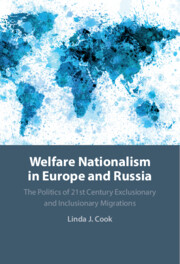 Welfare Nationalism in Europe and Russia
Welfare Nationalism in Europe and Russia Book contents
- Welfare Nationalism in Europe and Russia
- Reviews
- Welfare Nationalism in Europe and Russia
- Copyright page
- Dedication
- Contents
- Figures
- Tables
- Preface
- Acknowledgments
- Note on Terminology
- Abbreviations
- Part I Introduction
- Part II Economic Drivers and Political Mobilizers of Welfare Nationalism and Exclusion in Russia and Europe
- 2 Economic Drivers of Welfare Nationalism
- 3 Political Mobilizers of Welfare Nationalism
- Part III Exclusionary Migrations
- Part IV Inclusionary Migrations
- References
- Index
3 - Political Mobilizers of Welfare Nationalism
The Rise of Populist and Anti-immigrant Politics in Europe and Russia
from Part II - Economic Drivers and Political Mobilizers of Welfare Nationalism and Exclusion in Russia and Europe
Published online by Cambridge University Press: 14 November 2024
- Welfare Nationalism in Europe and Russia
- Reviews
- Welfare Nationalism in Europe and Russia
- Copyright page
- Dedication
- Contents
- Figures
- Tables
- Preface
- Acknowledgments
- Note on Terminology
- Abbreviations
- Part I Introduction
- Part II Economic Drivers and Political Mobilizers of Welfare Nationalism and Exclusion in Russia and Europe
- 2 Economic Drivers of Welfare Nationalism
- 3 Political Mobilizers of Welfare Nationalism
- Part III Exclusionary Migrations
- Part IV Inclusionary Migrations
- References
- Index
Summary
Chapter 3 focuses on political mobilizers of welfare nationalism, mainly popular attitudes toward welfare deservingness, and agents that mobilized anti-immigrant politics. The chapter elaborates on four types of deservingness criteria for migrants; need or vulnerability, ethnic closeness, contributions to receiving states’ economies and to their national security. It argues that societal norms for outsiders’ deservingness have narrowed in both Europe and Russia. Populist parties, anti-immigrant, and Euroskeptic are shown to be key mobilizers of welfare nationalism, abetted by anti-immigrant mass media. The chapter tracks one major populist party each in Britain, Germany, Italy, Sweden, and Poland, showing how that party gained vote share and national influence by opposing the CEE and MENA migrations. Using party programs and electoral outcomes, it shows how populists reinforced and amplified welfare nationalist grievances in societies, channeling them into electoral success and pressures for exclusionary migration policies. In authoritarian Russia, popular grievances against migrants are shown to be similar to grievances in Europe, but welfare nationalism was mobilized by regional elites, governors, and mayors. The chapter draws on arguments about authoritarian elites’ motivations to respond to popular grievances in order to explain how sub-national leaders used anti-immigrant mobilization for political advantage in Russia’s hybrid regime.
Keywords
- Type
- Chapter
- Information
- Welfare Nationalism in Europe and RussiaThe Politics of 21st Century Exclusionary and Inclusionary Migrations, pp. 59 - 92Publisher: Cambridge University PressPrint publication year: 2024
